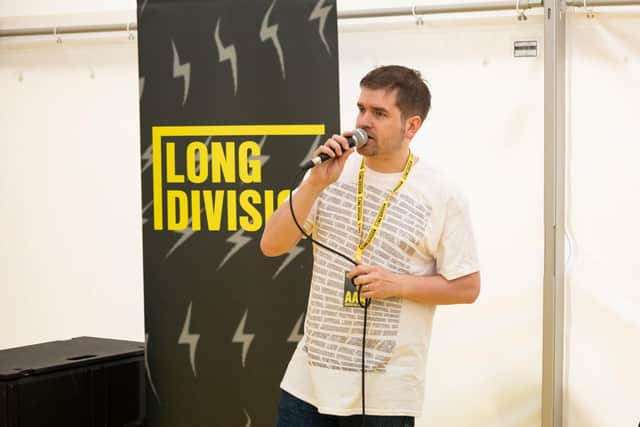Long Division director looks back on Wakefield's most popular music festival as it draws to a close
and live on Freeview channel 276
The festival, which has been a staple of the district’s summer calendar for a decade, will be held for the last time on Saturday June 10.
It began in 2011 when director Dean Freeman cashed-in his NHS pension to fund the fledgling project. Here he looks back on the impact Long Division has had on his own life and across the city and beyond over the last few years.
Advertisement
Hide AdAdvertisement
Hide AdDo you feel like you are waiting for a historian to come along and write a book about that last decade, just to make sense of what’s happened? I do. For reasons I’ll explain shortly, I’ve been looking back to 2011 and it feels like a hundred lifetimes ago. Brexit, Covid, Trump, Johnson. Libya, Sudan, ISIS, Palestine, Ukraine. Food banks, austerity, strikes, refugees, climate change.


It feels like the world has got so much heavier, and I’ve not even scratched the surface. Yet the reason I’ve been looking back is because in 2011, the festival I have shepherded for over a decade, was created. Creating Long Division Festival was a punt. Strangely in line with then Prime Minister David Cameron’s vision of The Big Society, it was a few music loving folk in Wakefield taking it upon themselves to create an event that championed Wakefield’s music.
It was a surprising success and ever since, one way or another, I have been trying to keep it alive. This weekend, however, it comes to an end.
If it is the hard stats that matter, then here you go. Rough estimates admittedly, but Long Division certainly brought in excess of 1000 performers to Wakefield across its 11 festivals in 12 years. Audiences and artists travelled from across the UK, sometimes Europe and the US. We likely brought in over a million pounds in secondary spend to bars, cafes, hotels, taxi ranks and shops. This is the impact culture can have. Getting people to a) travel to a place like Wakefield b) spend their money and c) potentially come back again is incredibly difficult but essential, especially in today’s economy. And we did it.
Advertisement
Hide AdAdvertisement
Hide AdI’d also say we paid artists around half a million pounds in fees. The absolute majority of those artists would not have come to Wakefield otherwise. In the early days, bringing them to Wakefield for the first time and showing them how great it could be opened a door where they would then return later in the year. But over the last decade as venues have disappeared, alongside audiences, that has ceased to happen.


People have, of course, asked why it is coming to an end, especially when I can display on paper the positive effect it’s had.
In part, I think it’s natural for things to end and new ones to begin. It’s a healthy thing in a city; new ideas and new blood surpass the old. But I feel this is a problem Wakefield has. Organisations here survive, but rarely thrive. The pride comes from how long you have endured hardship. It’s perhaps a characteristic that stems from our wider culture of being Northern, of industrial lives never lived in the spotlight. Stagnation can become a way of life.
Long Division tried to have its cake and eat it; we survived but over the last few years have worked hard to replace ourselves. Since 2021 - thanks to Youth Music funding - we’ve been able to employ a full team of 18-25 year olds. We teach them what we know but then give them the keys to the whole thing. We went into schools, helped young people form bands, gave them gigs and bought the city a PA to put on shows.
Advertisement
Hide AdAdvertisement
Hide AdYet despite all this, the uphill battle has become increasingly vertical and our attempts to professionalise what is essentially a pure passion project have failed. At its height, I was working 30 hours a week on Long Division - around a full time job. That’s the level of commitment required to make this work in Wakefield and we can’t in good conscience pass this on as normal working practice to a new generation. Especially one that can barely afford to buy a house, or a loaf of bread.


What does all this mean for Wakefield, and for you? Twelve years of Consonverative rule has brought us to this point here today, where I feel I must strongly advocate supporting local businesses and champion the power of culture, yet I know all too well how that ideal sits in contrast to the economic realities of all our lives.
All the best things - I believe - are the ventures that cannot be built purely from money. And for that reason, once they go, they rarely return. A music festival is not as important as nurses and teachers being paid fairly or politicians being held to account for their reckless and illegal behaviour. But it is one of many things that make life worth living. These frivolous endeavours are a barometer for how successful our society is. If the future is a perfectly surfaced road without a single pothole, yet every independent shop along that street is shut, something has gone wrong.
Whilst my memories of Long Division Festival tend to focus on the negatives and the insurmountable challenges, I will end on some positives. The stats, the battles, the unrequited love for Wakefield are, in the end, unimportant.
Advertisement
Hide AdAdvertisement
Hide AdThe true power of the festival was the moments it created. Friends and families making memories together in our fine city. Visitors, both on stage and in the crowd smiling, singing and sharing a second or two of thoughtless joy. Events and culture get us through the hardships we suffer in the 21st century and help tip the scales of Wakefield’s psychic balance ever so slightly towards a more positive vision of the future.
Long Division won’t make the history books. But if you were there, you know. To everyone else; support those grassroot, homegrown ventures. They make Wakefield, and our lives, that little bit better.